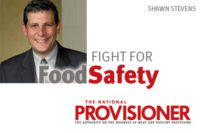On May 8, 2013, all small and very small establishments were required to have a written recall plan (9 CFR § 418.3). According to the regulation, these plans are to specify how the establishment will decide whether to conduct a recall and how the establishment will implement a recall. FSIS has just issued guidance for the small and very small establishments: Click here to view it.
Having issued the promised guidance, one can expect FSIS soon will start verifying that establishments have written recall plans.
The FSIS guidance provides a good model for small and very small establishments to use in developing the plan itself. However, based on experience with literally hundreds of recalls, having the plan is only the first step.
An establishment should gather a complete recall team and practice by conducting “mock recalls.”
Identify all key personnel
Within the establishment structure, the personnel to involve in recall situations is fairly self-evident: management, food safety, purchasing, sales and public relations.
An establishment should also reach outside its structure to identify experts that can assist in recall situations. This could include public relations, legal/regulatory and scientific experts (e.g., microbiologist, toxicologist, medical doctor and epidemiologist). These experts can assist in determining whether a recall is warranted and, if so, what product is implicated. Also, many of these experts have recall experience. Having someone on the team who has been there before provides a comfort level to an establishment having its first recall.
The establishment should identify its experts before a recall occurs. Having them on board and familiar with the establishment operation can save valuable time in a recall situation otherwise spent in identifying experts and educating them on your operations.
Finally, the establishment should maintain all current contact information for the team members.
Practice, practice and practice
Hopefully, no establishment will ever have to recall, but if an establishment must recall for the first time, having conducted even mock recalls before will help minimize the nervousness. Additionally, mock recalls can help identify weaknesses in establishment records or support that can then be addressed before a real recall situation occurs. The following “mock recalls” pose the most common recall issues.
- Adulterant/Positive Product Sample – If FSIS (or a state/customer) samples your product and it tests positive for an adulterant, can you “correctly” identify the product implicated by the sample.
- With FSIS testing, many recalls have occurred following an agency positive, not because the establishment did not hold product, but because it did not hold all product represented by a sample. On your next agency sample, pretend it is positive and that the agency alleges that you did not hold all implicated product. Could you and your team support your lotting practices to demonstrate that all implicated product was indeed held?
- With a state or customer test, the product is often already in distribution. Determining what product is implicated entails tracing product back up from the positive to the “lot” of production implicated, supporting the decision as to which product is implicated, and then tracking downstream to identify all customers who received product from the implicated lot.
- Undeclared Allergen — There have been simply too many recalls based on undeclared allergens. In part, this is caused by use of the wrong label during production. Other times, a supplier might have changed its formulation to add/change an allergen. A mock recall based on a change in ingredient (the addition of a previously undeclared allergen) helps an establishment determine if it can trace an ingredient through its process, identifying all products which could be implicated.
- Foreign Material — Conducting a mock recall on potential foreign material provides the best experience in determining whether a recall is necessary. In these cases, it is balancing the likelihood other contaminated product is in the market with the potential risk posed by the foreign materials. This exercise could have the establishment reaching out to its experts.
By conducting the mock recalls above, an establishment can identify areas for improvement in records and support so it can make enhancements to avoid issues in any recall.









